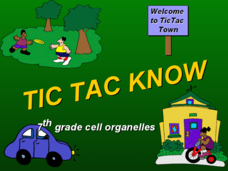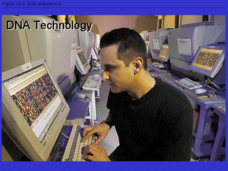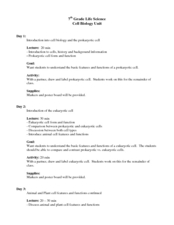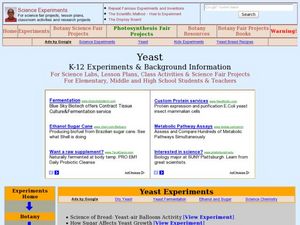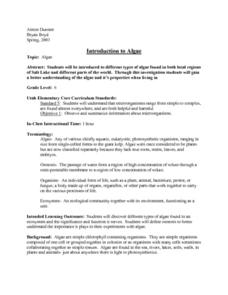Howard Hughes Medical Institute
Spreadsheet Tutorial 2: Autofill Data, Cell References, and Standard Deviation
If you've always wanted to know more about spreadsheets, here's a perfect resource for you. A self-paced tutorial introduces how to autofill and copy formulas in a Google sheet or Excel spreadsheet. It also shows users how to find range,...
Howard Hughes Medical Institute
Spreadsheet Tutorial 1: Formulae, Functions, and Averages
Spread your knowledge of spreadsheets. The first of five tutorials in the Spreadsheet Data Analysis unit introduces the basics of spreadsheets. It shows future data analysts how to organize and format tables, and how to use functions to...
Cold Spring Harbor Laboratory
The RNA Message Is Sometimes Edited
In 1993, Phillip Sharp and Richard Roberts won the Nobel Prize for their discovery of split gene theory. Learn about the breakthrough with the help of an online interactive. Hear both scientists explain it in their own words, watch an...
Cold Spring Harbor Laboratory
Higher Cells Incorporate an Ancient Chromosome
Chromosomes contain keys to history including links from royalty to Neanderthals. Young scientists learn about Ivan Wallin's research into chromosomes with an animation and videos. Then, the concept connects to mysteries related to...
Cold Spring Harbor Laboratory
Development Balances Cell Growth and Death
Cells demonstrate a life cycle like other living things, but what if death was no longer part of the cycle? Learn about the important balance requiring death to continue functioning. An online interactive introduces a group of scientists...
Cold Spring Harbor Laboratory
Some DNA Does Not Encode Protein
Roy John Britten easily earned a PhD in nuclear physics—but he found painting with water colors too difficult. Young scientists learn about Britten's life, career, and research with an online interactive. They read a biography, view...
Curated OER
Mutations and Gene Regulation
Teenaged scientists can use this quiz or study guide to show off their understanding of genetic mutations and their causes; includes short answer, multiple choice, matching, and more.
Curated OER
Classification Number Two
A three-page quiz assessing budding biologists' understanding of classification. Middle-level learners may need a little additional time on this, but should be able to handle the concepts with ease.
Curated OER
Tic Tac Know: organelles
Tic-Tac-Toe is a game most students will be familiar with. This fun activity prompts students to answer questions about cells organelles in order to place a mark on the grid. There are some non-essential humorous sound effects and...
Curated OER
DNA Technologies
After giving some of the basic characteristics of the DNA molecule, the slides provide process information and many detailed diagrams about plasmids, vectors, and their application in cloning genes.
Curated OER
Protists
With this collection of slides, future biologists get to view photographs of protozoans from different phyla. Interspersed with the photos are bullet-style notes listing characteristics of each group. Unfortunately, most of the pictures...
Curated OER
Strange Bugs
As individuals or in small groups, marine biologists research and discuss archaea and their unusual behavior as compared to bacteria. Teach them about the chemical makeup of the cell membrane of these strange organisms. This complex...
Curated OER
Cell (Biology)
Students conduct a series of activities to explore the nature of cells. In this biology lesson, students observe plant and animal cells under the microscope and compare them. They differentiate osmosis and diffusion.
Curated OER
Yeast
Students study the characteristics of yeasts. In this biology lesson, students conduct experiments to measure yeast respiration. They discuss the favorable conditions needed for growing them.
Curated OER
The Wonders of Bacteria
Students explore the evolution and features of bacteria through a series of activities. In this biology lesson, students collect data and graph bacterial growth. They design a brochure about bacteria's role in society.
Curated OER
Discovering the Forgotten Kingdom Protista
Protists, like algae and mold, are sometimes overlooked for classroom study, but they are astonishing in their diversity and importance.
Curated OER
The Virtual Electron Microscope
Students explore the world of the very small using a Flash plug-in Virtual Electron Microscope. They complete and discuss an activity in which unknown samples are placed under the computer simulated microscope to determine where the...
Curated OER
Regulating Gene Expression
In this gene expression worksheet, students read about two transcription factors: activators and repressors. Students complete 1 multiple choice and 5 short answer questions.
Curated OER
The Classification of the Kingdoms of Life
Students can learn about the evolution of science by discussing the classification of living things.
Curated OER
Cell-to-Cell
Ninth graders use online tutorials, class discussion, presentations and scientific articles to explore types of cells along with cell structure, function and behavior. They explore ethical questions related to cells and disease.
Curated OER
Plasmolysis in Elodea Plant Cells
Students microscopically observe various subcellular components. They determine the effects of different salt solutions on Elodea plant cells. They detect the presence of chloroplasts, cell walls, and cell membranes of Elodea.
Curated OER
Exploring the Great Salt Lake
Third graders participate in a scavenger hunt, looking for things that are unique about the ecosystem in and around the lake. They observe and describe a variety of habitats and distinguish living and nonliving elements of...
Curated OER
Introduction to Algae
Students explore different types of algae found in both local regions of Salt Lake and different parts of the world. They discover different types of algae found in an ecosystem and the significance and function it serves.
Curated OER
Atomic Structure and Bonding
Eighth graders discuss and write about what led up to the discovery of the atom. Students label proton, nucleus, electron, and neutron in their notes. Students take notes on electron shells and how different atoms have different...








